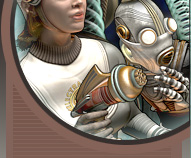Sometimes we find ourselves in a position so incredibly bad - so apparently insane, in fact - that we can't understand how we got from Point A to Point B. The reason we can't understand this is that Point A was something as simple as "I'd better get out of bed now", while Point B is something as strange as "I guess the only way out of this is to take my Doomsday Machine into a near solar orbit, and then heave it into the Sun."
If you were to wander into this story at Point B you would decide that Lew was a madman and probably deserved everything that was coming to him, with the unfortunate corollary that the Earth would also come to an end. But life is just so much more complicated than that.
It's possible to go from Point A to Point B through a series of slightly bad decisions. On the cusp of each of these slightly bad decisions you look around, see that you're in a bad spot, and choose an option. The option that looks best in your situation may be just a little bit bad; but all the other options look even worse. If you choose the slightly bad option over and over again you find yourself in an ever-worsening downward spiral that has no apparent end except, in Lew's case, the end of everything.
This whole process is well documented in Frakenwiler's classic How We Got From Here To There, And Why We Shouldn't Have. Frakenwiler's conclusion is that a sequence of slightly bad decisions comes down to the conflict between two old adages about money.
If we look at our bad options and choose the worst one because, really, it's only a little bit bad and (who knows?) it might even work, we are telling ourselves that 'In for a penny, in for a pound' applies to our case. We decide to go a little bit more wrong in an effort to make things right.
If, on the other hand, we ask ourselves whether it makes sense to 'Throw good money after bad' we have a chance to get out of the cycle and stop making things even worse, not to mention putting a little something by for our retirement.
Of course this doesn't always seem practical: if Lew got out of the cycle now the Earth was going to be eaten by his experiment. So Lew (like most of us) threw his pound in with his penny and headed for the Sun. We shouldn't judge him too harshl
March 24th, 2011 at 8:28 pm
Given that I’m reasonably willing to go along with the idea that this page was written *ages* ago, and not in response to the previous page’s comments, looks like someone else was having trepidations about the overall wisdom about this idea as well…. 😉
March 24th, 2011 at 11:20 pm
Well…. I did say it was one possibility, after all. 🙂
March 27th, 2011 at 5:10 pm
Bradley: I checked back in after some time away (loss of computer, new computer…oh, hey! What’s Bradley doing over at Thrilling Tales?) and love your Clockwork Book. Definitely shudder at the possibilities of adding too much mass to the sun, especially of this inertrium variety. But you tell a tale so well, and illustrate it so splendidly, that I’ll just have to enjoy the ride, however destructive!
March 27th, 2011 at 5:22 pm
Hi, Stephen – happy to see you back!
The Clockwork Book is – of course! – meant to give folks like you a reason to wonder what I’m doing, a little more often :).
Just the other day I was thinking about another Kickstarter promotion, ’cause I think it would be nice to see a limited hardcover edition of this one when it’s ready. I ran across an outfit that does really nice editions with stamped covers and acid free paper. Time will tell.
March 27th, 2011 at 10:54 pm
Count me in on a hardcover if you have them printed!
November 8th, 2016 at 8:42 pm
wow, just stumbled upon this website and it’s so cool! love it. bradley, your work is amazing!




